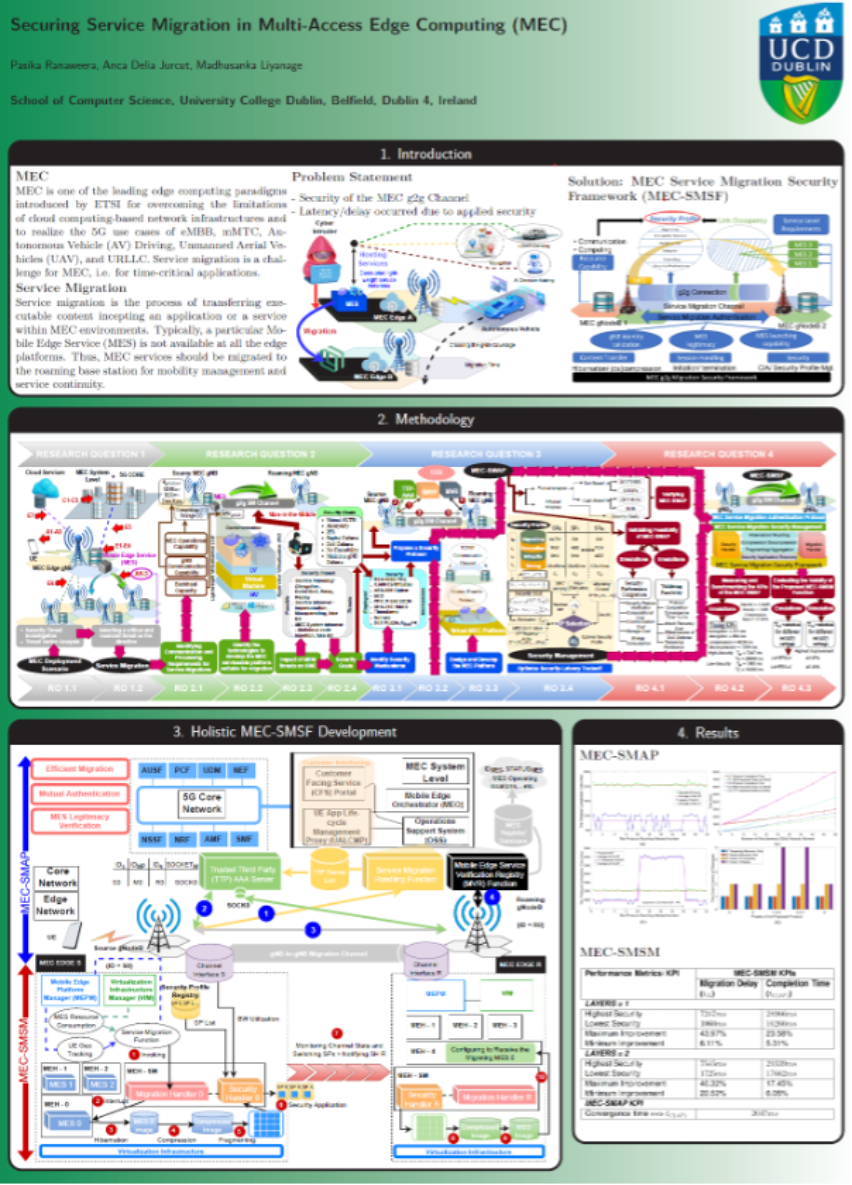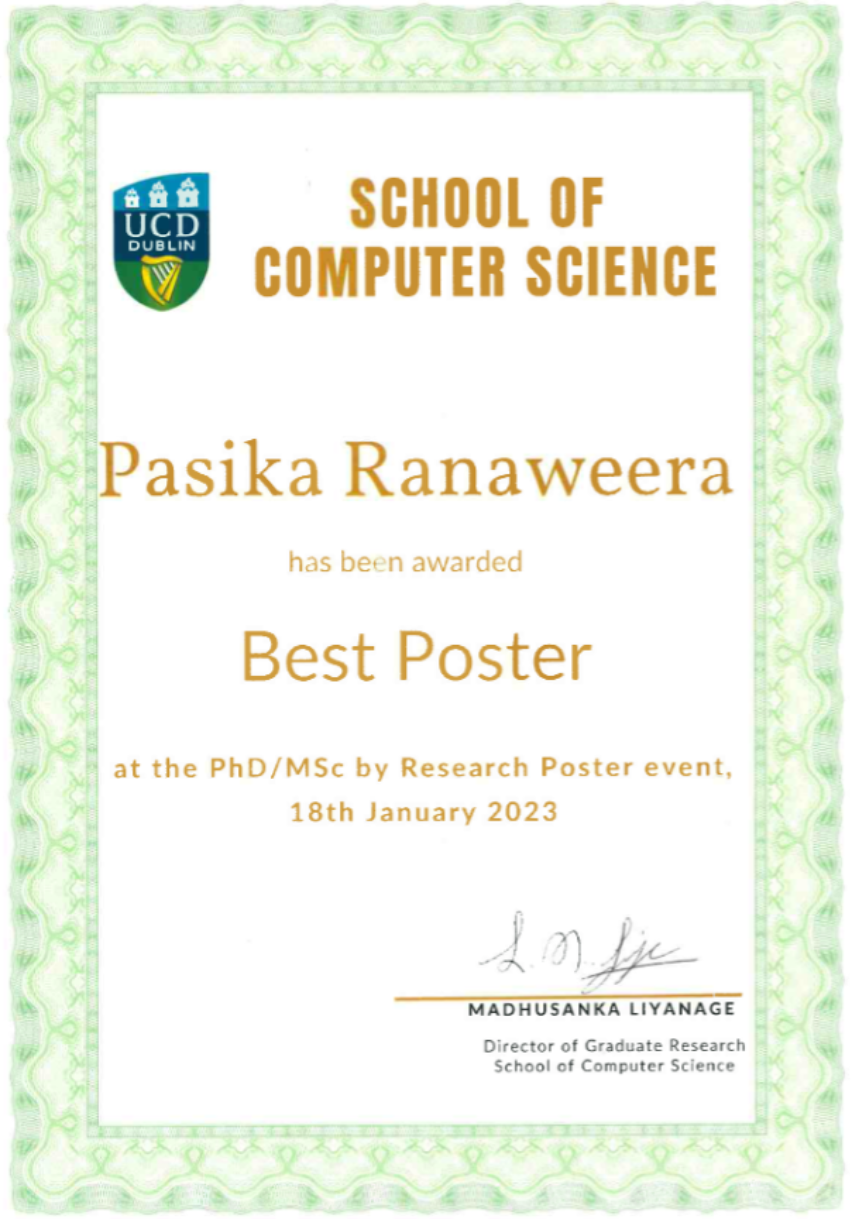Student profile: Pasika Ranaweera, PhD student
Blog
- Student Profile: Mahmoud Said El-Sayed Abd-Allah
- Can election results be predicted by correcting biases in social polls from X?
- International Women’s Day: Celebrating Ad Astra Scholar Ava Canning
- Chinese New Year 2024 Celebration
- MSc Advanced Software Engineering Alumni
- Generative AI in Computing Education: Wrecking Ball or Holy Grail?
- My internship in digital strategy at Limerick City & County Council
- Clown Computing 101
- International Men's Day 2023
- Top marks for ChatGPT in the Leaving Certificate Computer Science Examination
- Alumnus Interview
- Student profile: Pasika Ranaweera, PhD student
- Staff profile: Associate Professor Neil Hurley, Head of School
- UCD CS PhD candidate award from IEEE Consumer Electronics Magazine
- UCD-Insight Collaboration Wins Prestigious Publication Award
- W@CS Alumni Roundtable
- Staff profile: Dr. Fatemeh Golpayegani
- Interning at a Smaller Tech Company
- Powering through the pandemic: My Remote Research Internship Experience
- Exploring Sense of Belonging in Computer Science Students
- Student Inter-Society Tech & Enterprise Meetup (SISTEM) held in UCD
- Computer Science Research and the COVID -19 Pandemic
- Zoom fatigue: how to make video calls less tiring
- SIGCSEire Launched at UCD CS
- Best Paper at the International Conference on Case-Based Reasoning (2019)
- ‘Spare tire genes’ explain why some genes can be lost by cancer cells
- Bi-annual CS Graduate Research Symposium
- UCD CS Postdoctoral fellow Claudia Mazo selected as a member of the ACM Future of Computing Academy
- Security, Privacy and Digital Forensics in the Cloud
- Chidubem Iddianozie: PhD student and GitHub Ambassador in UCD
- UCD CS PhD student selected to attend the Heidelberg Laureate Forum
- New Project: Evidence-Based Decision Support for Real-Estate Investment
- UCD projects celebrate Europe Day
- Research Award at the 2019 ACM SIGCSE Technical Symposium on Computer Science Education
- Top Tips for Student Scholarships
- I am a Computer Scientist and a Cancer Biologist
- Critical thinking and data ethics in UCD CS
- Teaching at BDIC Beijing
- Reading 35,000 Books
- Secret to a Great Internship
- 12 Tips for PhD Researchers
- Buddy Coders - a new initiative to support women in Computer Science
Student profile: Pasika Ranaweera, PhD student
Pasika is a PhD candidate and Post-Doctoral Researcher in the School of Computer Science. He is Project Manager of the EU Horizon project (opens in a new window)CONFIDENTIAL-6G (Confidential Computing and Privacy-preserving Technologies for 6G) and a member of the Network Softwarization and Security Labs (NETSLAB) research group that mainly focuses on the security and privacy of future mobile networks, including 5G and 6G.
Tell us about your research
My research is a combination of telecommunication and computer science around emerging 5G technology. Edge computing improves the feasibility of 5G technologies meeting service level guarantees of data, latency, and reliability. I was interested in the security of Multi-Access Edge Computing (MEC), and security in an aspect of MEC called service migration, which is required when a mobile device is moving from one MEC edge base station to another. Though applying security is an obvious solution, they will increase the delay to the migration, so my thesis introduces a security management mechanism that is a vital research contribution to emerging autonomous vehicles and unmanned aerial vehicle applications.
Why did you do a PhD?
Straight after my graduation with a BSc in Engineering, I was recruited as a demonstrator and then promoted to a temporary lecturer. I realized that I loved teaching and tutoring, and decided to pursue my career in that direction. In my MSc I specialized in Information Security, and I have excelled in the areas of applied cryptography, designing security protocols, vulnerability analysis of existing protocols, and investigating security flaws in converged technologies of Internet of Things (IoT). Although I enjoy lecturing, I was keen on conducting research and doing a PhD is the next step in my career plan toward academia. I was looking for an opportunity and access to state-of-the-art knowledge and tools and to be part of a distinguished research group to improve my professional profile. Fortunately for me, I was selected by the School of Computer Science at UCD to pursue a PhD.
What's it like doing a PhD?
It’s like a journey towards a once-in-a-lifetime achievement in four years. The effort, dedication, focus, commitment, confidence, and attitude matter highly during this journey. Once you land a PhD studentship, you are assured that you will eventually make this journey since the selection process for a Ph.D. is rigorous. Being selected, especially in a highly recognized institute such as the School of Computer Science in UCD, gives you that assurance and confidence. However, where you intend to conclude your journey is entirely up to you and your supervisory team. It depends on your motivation and self-satisfaction, visualizing where you want to end up after four years. I was motivated from the start by my supervisor Dr Anca Delia Jurcut, and co-supervisor, Dr Madhusanka Liyanage and a clear goal was perceived for me. The progression through the milestones on the planned path was satisfying. The articles and conference papers I published raised my confidence and motivated me to reach for the intended outcomes of the PhD. The thought of being part of state-of-the-art research that will contribute to the world’s progression always made me feel contented. However, there were some tough times and stressful situations created by doubts I faced during the design stages of my work. Thankfully, my supervisor and co-supervisor supported me by reassuring and trusting me to escape that shell. During the final stages, when I was writing my thesis, I felt a great deal of pressure. My wife was there to support me in addition to the supervisory team. Finally, when I got through my viva, it was a simple sense of relief, achievement, and self-satisfaction more than triumphant glory.
What is the role of a Ph.D. supervisor?
The Ph.D. supervisor is there to guide the student, not to do the research on their behalf, nor to ignore the student completely. Communication and understanding between the supervisor and the student is the key to success. As a fresh PhD student, doing research, the culture in a university, the expectations of a PhD, is quite alien at first. The supervisor is the first person the student will look to for assistance and even consider a role model. They provide the navigation information, but the student is still the ship’s Captain, where the decision-making is purely their choice. Fortunately, my supervisor and co-supervisor were the kindest and most motivated mentors I have ever had, even though I was their first PhD student. Initially, they guided me in selecting the tentative research topic, understanding the scientific method, identifying research gaps, exploiting research findings, and writing research papers while checking my progress at every step. When I matured to the final stages of the study, they trusted my competence and allowed me to thrive in a supportive environment. Ultimately, they assisted me in completing my thesis and facing my defense viva. In my experience, that is the best way to supervise.
What skills did you develop while doing a Ph.D.?
I gained many skills over the past four years. One of the primary skills I gained is my research ability. I can successfully assimilate state-of-the-art knowledge about a research directive, identify specific research gaps, define research problems to align with the initial hypothesis, propose a solution for the problems via research objectives, formulate a methodology to address the stated research objectives, and validate the proposed solution. My writing skills improved substantially as I targeted high-impact journals, transactions, and conferences during the Ph.D. I gained more skills in relation to my research topics’ implementation aspects, as I had to develop prototype software systems, emulation, and simulation setups to validate and verify my proposed theories. My communication skills improved as I communicated with my supervisor and co-supervisor during weekly meetings and with other Ph.D. candidates during TA and demonstration work. Research dissemination events, such as conferences and poster events, allowed me to converse with large audiences. I improved my teaching skills with demo work conducted at the UCD and BDIC. I believe all these will be beneficial for me in future.
What keeps you motivated in your studies?
My prime motivation is the fact that I am doing what I love. My Ph.D. topic amalgamates my favourite research fields: mobile communication/networking and security. I was always fascinated by advances in telecommunication, especially 5G and 6G. And security was something I was keen on learning from my undergraduate days. In addition, I have always wanted to pursue a career in academia, and I dreamt of being involved in state-of-the-art research. My supervisor and co-supervisor are progressing rapidly in their research careers, which positively affected me to follow in their footsteps. For day-to-day studying, as I was pacing myself well enough and wouldn’t overload myself (except during the thesis writing stage), I found myself motivated enough to pursue the planned activities.
What’s it like to live in Ireland?
I was mesmerized by Dublin when I first came here. As an international student in a new city, it was welcoming for me, as there were more international people than locals. On the contrary, I was quite amused by the kind and hospitable gestures of the Irish locals, a quality that I haven’t felt in my travels. I was keen on visiting the beautiful sites in the Dublin city centre. Though I am not a frequent visitor, Irish pubs are something unique. I resided in the spectacular town of Bray for most of my stay here. The beach at one end and the Wicklow mountains at the other were a pleasant sight. And the environment at UCD is the best to relax and chill when stressed from work. The only downfall with Dublin is the cost of living, especially the accommodation. But you will eventually learn to adapt to a lifestyle that balances your stipend and the expenses.
What are you looking to do after you graduate?
I have always wanted to pursue a career in academia. I am already working as a Post-Doctoral Researcher and filling the manager role of the CONFIDENTIAL-6G project, working alongside PI Dr Madhusanka Liyanage and Co-PI Dr Shen Wang. This is an excellent opportunity for me to gain experience in networking, funding/grant application, and extend my research experience in addition to teaching and mentoring. With enough experience, I intend to be recruited as a lecturer in an academic institute that would allow me to conduct teaching and research. I hope I am on the right track.
What advice would you have for anyone considering doing a PhD?
A Ph.D. is an achievement more than a simple qualification. It is a result of three or four years of committed hard work. I urge anyone with an idea to do a Ph.D. to know the research topic you should work on. If the topic is in a field you are interested in, it is a good choice. Otherwise, you might not be motivated to pursue the topic with enough enthusiasm. Further, attempt to get an idea of your supervisory team and see whether the supervisor’s work ethic suits you. Once you start your Ph.D., try to understand what is expected from a Ph.D. in your field. Out-of-the-box thinking is an attribute I benefitted from most in my research designs. Communication with your supervisor is the key to success. Four years is a long time, so do not restrict yourself just to study. Attend academic and social events, pursue other research without affecting your Ph.D. work, and enjoy life. Doing a Ph.D. is a lifestyle similar to a profession and the sooner you adapt to it, the sooner you can thrive in it.
Figures
Edge Computing
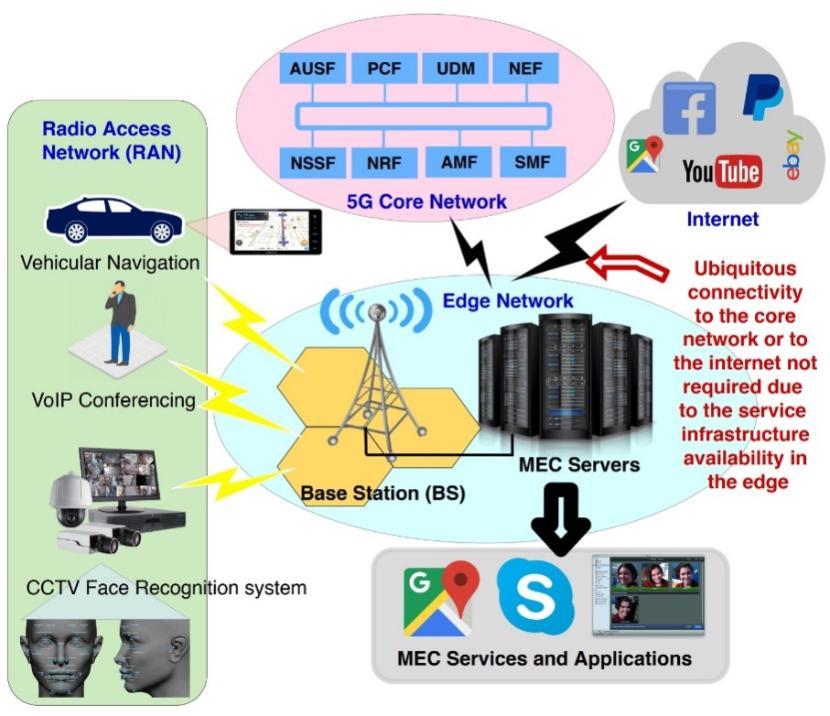
MEC Advantages
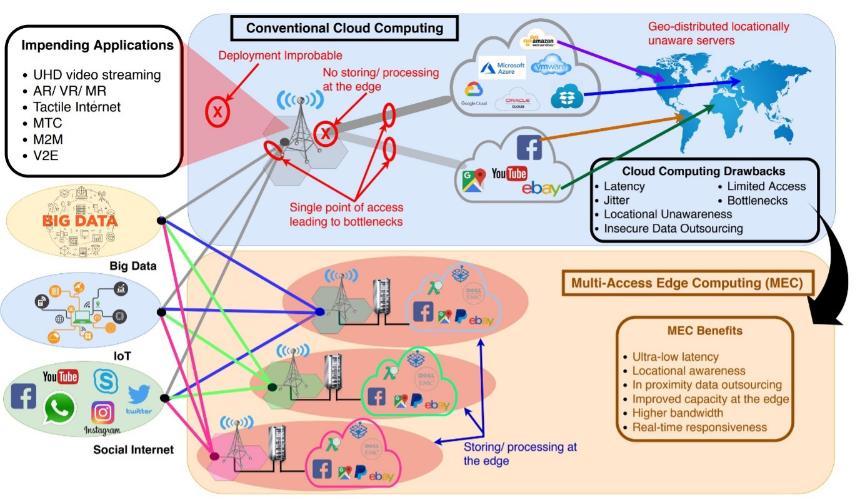
Ph.D. Problem and Solution
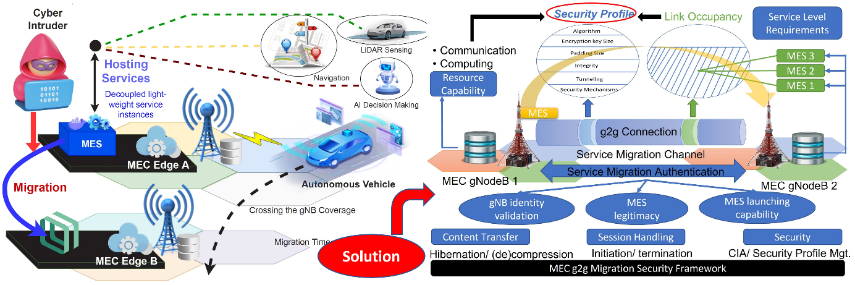
Design of the Proposed MEC-SMSF System
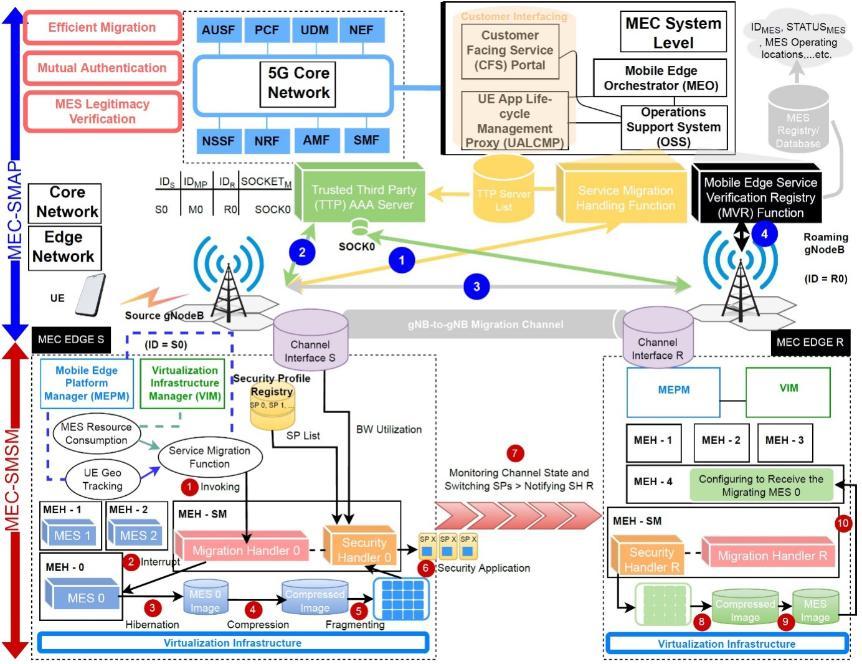
Poster
